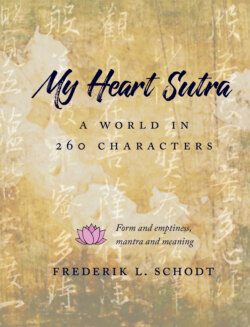Читать книгу My Heart Sutra - Frederik L. Schodt - Страница 9
На сайте Литреса книга снята с продажи.
THE OFFICIAL SŌTŌ ZEN ENGLISH TRANSLATION OF THE HEART SUTRA Heart of Great Perfect
Wisdom Sutra
ОглавлениеAvalokiteshvara Bodhisattva, when deeply practicing Prajna Paramita, clearly saw that all five aggregates are empty and thus relieved all suffering. Shariputra, form does not differ from emptiness, emptiness does not differ from form. Form itself is emptiness, emptiness itself form. Sensations, perceptions, formations, and consciousness are also like this. Shariputra, all dharmas are marked by emptiness. They neither arise nor cease, are neither defiled nor pure, neither increase nor decrease. Therefore, given emptiness, there is no form, no sensation, no perception, no formation, no consciousness; no eyes, no ears, no nose, no tongue, no body, no mind, no sight, no sound, no smell, no taste, no touch, no object of mind, no realm of sight … no realm of mind consciousness. There is neither ignorance nor extinction of ignorance, neither old age and death, nor extinction of old age and death. No suffering, no cause, no cessation, no path, no knowledge, and no attainment. With nothing to attain, a Bodhisattva relies on Prajna Paramita, and thus the mind is without hindrance. Without hindrance, there is no fear. Far beyond all inverted views, one realizes Nirvana. All Buddhas of past, present, and future rely on Prajna Paramita and thereby attain unsurpassed, complete, perfect enlightenment. Therefore know the Prajna Paramita as the great miraculous mantra, the great bright mantra, the supreme mantra, the incomparable mantra, which removes all suffering and is true, not false. Therefore we proclaim the Prajna Paramita mantra, the mantra that says: “Gaté Gaté Paragaté Parasamgaté Bodhi Svaha!”
Available at https://global.sotozen-net.or.jp/eng/practice/sutra/pdf/01/04.pdf.
A DESCRIPTION OF THE HEART SUTRA
The Heart Sutra articulates the doctrine of “emptiness.” But this “emptiness” must not be understood as the denial of phenomenal existence—it is not nihilism. What it teaches is that everything is dependently arisen from conditions; an event (a “thing”) occurs if and only if the adequacy of conditions obtains. Since everything is dependently arisen, there is no such thing as an eternally abiding entity. The doctrine of emptiness also spells out the relativity of all views. When one acquires this Wisdom of “emptiness,” one will realize that all physical and mental events are in a constant process of change, and accordingly everything can be changed by modifying the conditions. Understanding the relativity of all standpoints will also prevent one from becoming irrationally attached to things. In this way, one will come to be free from mental obstructions, and attain to perfect harmony and bliss. At the same time, with the understanding that all are dependently arisen, one will treasure and make good use of the conditions that are available, realizing the idea of benefiting oneself and others.
Displayed on a bronze plaque at the bottom of the Wisdom Trail on Lantau Island, Hong Kong.
